A small shrub used to make IndyCar racing tires could help save rainforests and make deserts greener
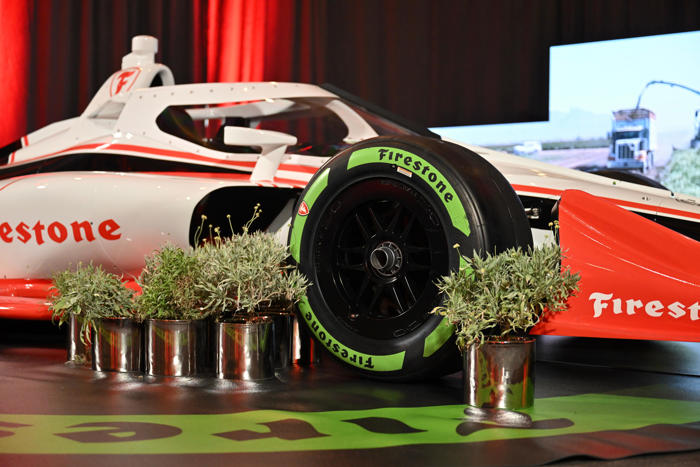
Firestone IndyCar race tires made with guayule. The desert shrub could help supplement the rubber harvested from delicate rainforests. Joey Bordelon/Bridgestone
- Bridgestone is growing desert shrubs called guayule in Arizona as an alternative source of rubber.
- Guayule could be a sustainable domestic source of rubber, helping reduce deforestation.
- This article is part of "The Future of Supply-Chain Management," a series on companies' manufacturing and distribution strategies.
If you've watched IndyCar racing over the past couple of years, you may have seen some of the cars using green tires with a difficult-to-pronounce name.
The name is guayule, pronounced why-OO-lee. It's a small desert shrub native to the southwestern US and Mexico that Bridgestone uses to make the rubber in the sidewalls of its green Firestone-branded racing tires.
Nick Eulau, the executive director for guayule and end-of-life tire recycling at Bridgestone, said the company's ambitions for guayule go beyond the race track.
Bridgestone is trying to develop a sustainable domestic source of natural rubber that could help stem reliance on supplies from tropical forests while bolstering biodiversity and agriculture in arid climates.
Guayule has been a source of natural rubber for a century. Firestone, which was acquired by the Japanese tire giant in 1988, has been working with the shrub since World War II.

Scott Dixon taking the checkered flag in Long Beach using Bridgestone's Firestone guayule tires. MediaNews Group/Inland Valley Daily Bulletin via Getty Images/Getty Images
But Bridgestone's interest in the desert shrub ramped up in the early 2010s, when it launched its guayule research initiative and broke ground on a Biorubber Process Research Center in Mesa, Arizona. That facility was followed by a 281-acre guayule farm in nearby Eloy.
Where does rubber come from?
More than 330 million car and commercial truck tires were sold in the US in 2023, according to the US Tire Manufacturers Association.
The trade group estimates natural rubber accounts for about one-fifth of the materials in a passenger tire and one-third of the materials in a commercial truck tire. The rest of the tire is composed of synthetic rubber, steel, and fillers such as silica and carbon black.
Nearly all that natural rubber comes from the Hevea brasiliensis, or rubber tree, found in forests and plantations primarily in Southeast Asia, with some in West Africa as well.
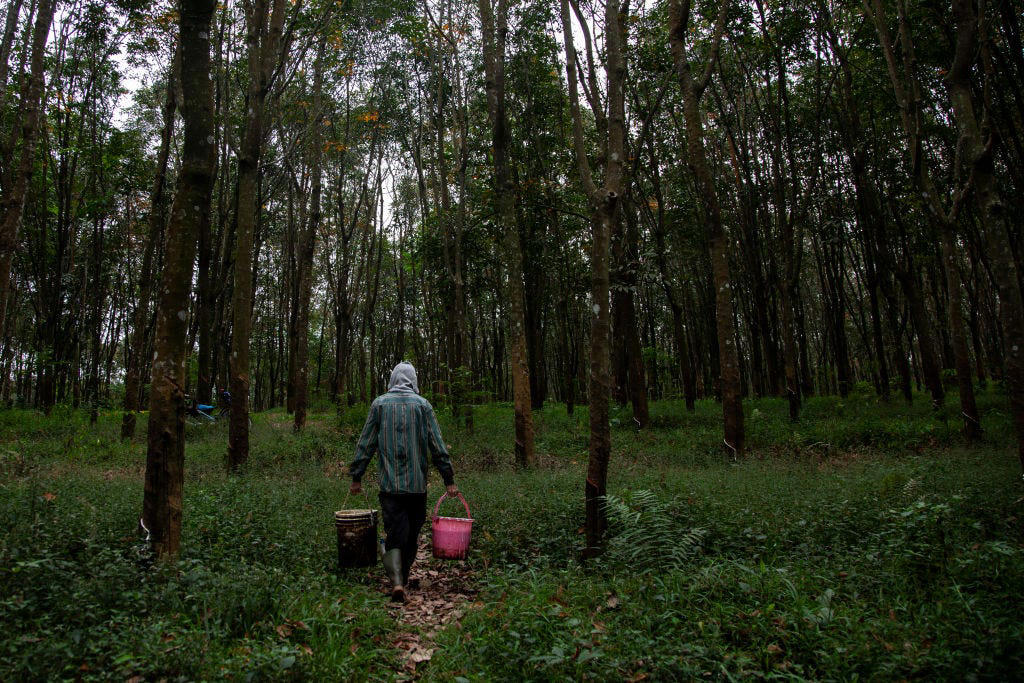
Tappers harvesting rubber sap at a plantation in Indonesia. NurPhoto/Getty Images
At these plantations, about 220 rubber trees are planted per acre. They're ready for harvest in six or seven years.
"The actual harvest method is a tree-by-tree manual process where workers use a special tool to cut grooves into the tree's bark, and the liquid latex flows out, like when you tap a maple tree for syrup," Eulau told Business Insider.
Each tree can produce as much as 330 pounds of rubber during its 20- to 30-year lifetime, after which the trees are cut down for wood and a fresh crop is replanted.
Why guayule?
A reliance on the rubber tree as the primary source of natural rubber could threaten both tropical forest ecosystems and the long-term stability of the global rubber supply chain.
The trees that are the backbone of the natural-rubber supply chain are susceptible to disease. While the trees are native to the Amazon, leaf blight helped kill off large-scale rubber production in the region nearly a century ago.
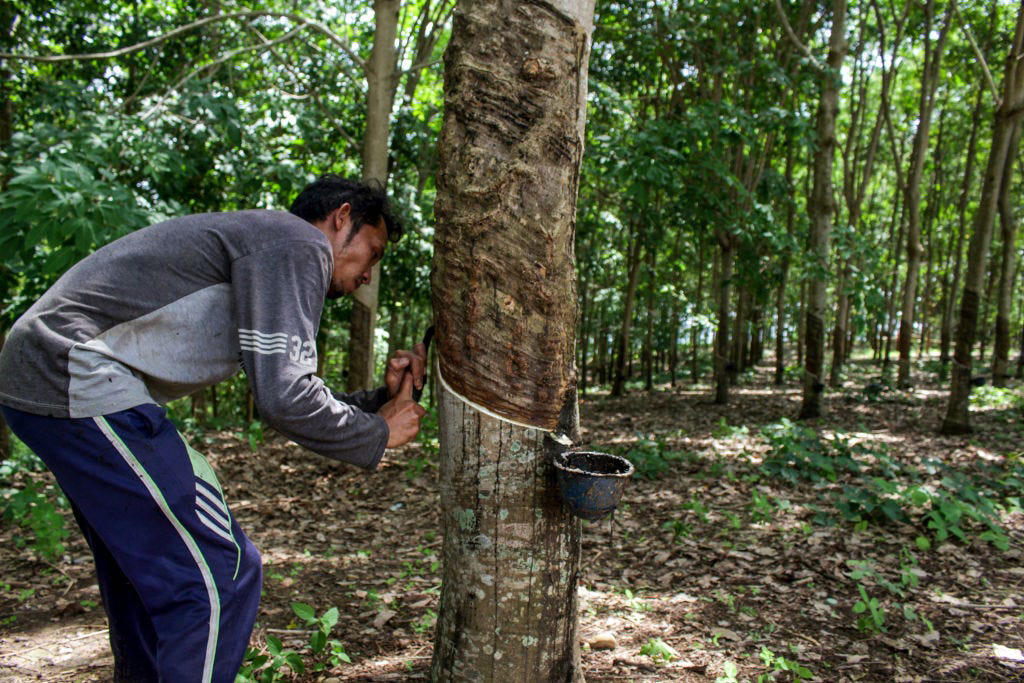
A worker at a plantation in Indonesia harvesting rubber. SOPA Images/Getty Images
In addition, environmentalists have accused the rubber industry of contributing to large-scale deforestation in Southeast Asia. A 2023 study published in the journal Nature by researchers from Europe, the UK, and China found that more than 4 million hectares, or nearly 10 million acres, of rainforest had been lost to rubber production in Southeast Asia since 1993.
The mass cultivation of guayule may help support biodiversity and protect topsoil from the ravages of a harsh desert climate.
While many plants can't survive the dry heat of the Sonoran Desert, where Bridgestone's Eloy farm is located, it's guayule's natural environment.
Eulau said the plants on Bridgestone's farm require irrigation but use far less water than other crops prevalent in the region.
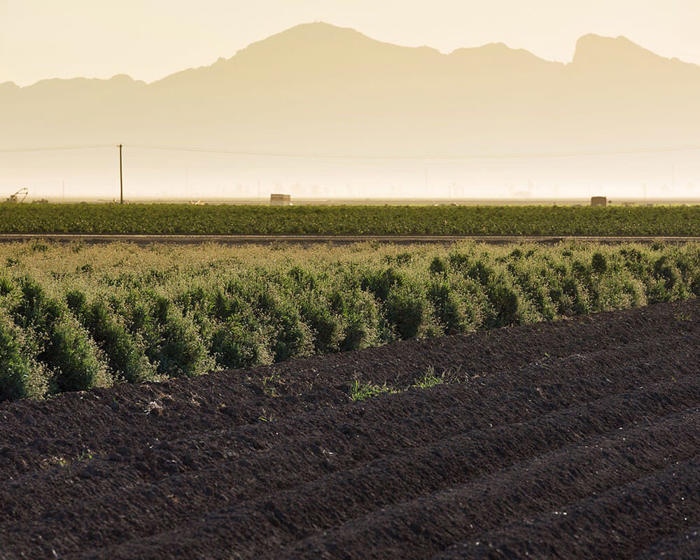
Long rows of 20-inch-tall guayule plants take about two years to reach maturity. Bridgestone.
A farmer in Arizona told Popular Science in 2022 that corn required nearly twice as much water during a four-month growing season as guayule did in a year.
Eulau told BI that guayule cultivation "enables continued agriculture in regions where the amount of crop you produce is not really governed by the acreage of land available but instead by the water available."
The shrubs also help protect the topsoil. "If you can use a little water to keep guayule growing on your land," Eulau said, "it reduces dust pollution and helps keep the biological material in the soil, which promotes soil health and its long-term prospects for agriculture."
At harvest, the farm relies on industrial machinery to bear the brunt of the load.
"When you harvest, you cut off the top, a few inches from the ground. We take everything except the rootstock, which the plant will regenerate from," Eulau said. "Everything is done with large tractors and industrial machinery, so it's far less labor intensive."
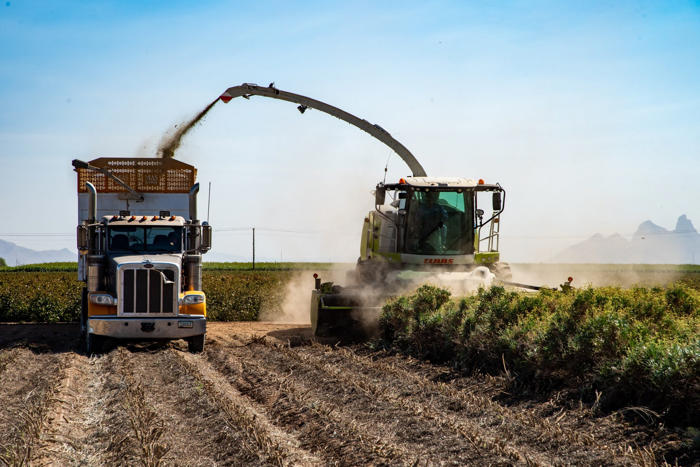
Guayule harvesting in Arizona. Bridgestone.
The harvested plants are sent to Bridgestone's processing center in Mesa, where rubber, resin, and other biomasses are extracted.
In addition to Arizona, Bridgestone has growing trials in Texas, New Mexico, and Argentina to evaluate the potential for commercial guayule cultivation in those areas.
What's the holdup?
Though Bridgestone is working to make its guayule more drought-resistant and able to generate better yields, its rubber is ready for commercial use.
"We have shown that we can do it," Eulau said. "We can produce a guayule rubber that's perfectly useful for the tires on your minivan."
But commercial guayule farming is still in its nascency.
Scaling guayule farming for a supply chain would require more refineries and production facilities. Bridgestone would also want to refine crop genetics and set best cultivation practices for farmers.
Even when the guayule is ready for the big time, don't expect it to replace rubber trees. Bridgestone sees guayule as a supplemental source of rubber rather than the successor to the rubber tree.
"Both supply chains will continue to exist in parallel, at least for a relatively long period of time," Eulau said.
If you enjoyed this story, be sure to follow Business Insider on Microsoft Start.
